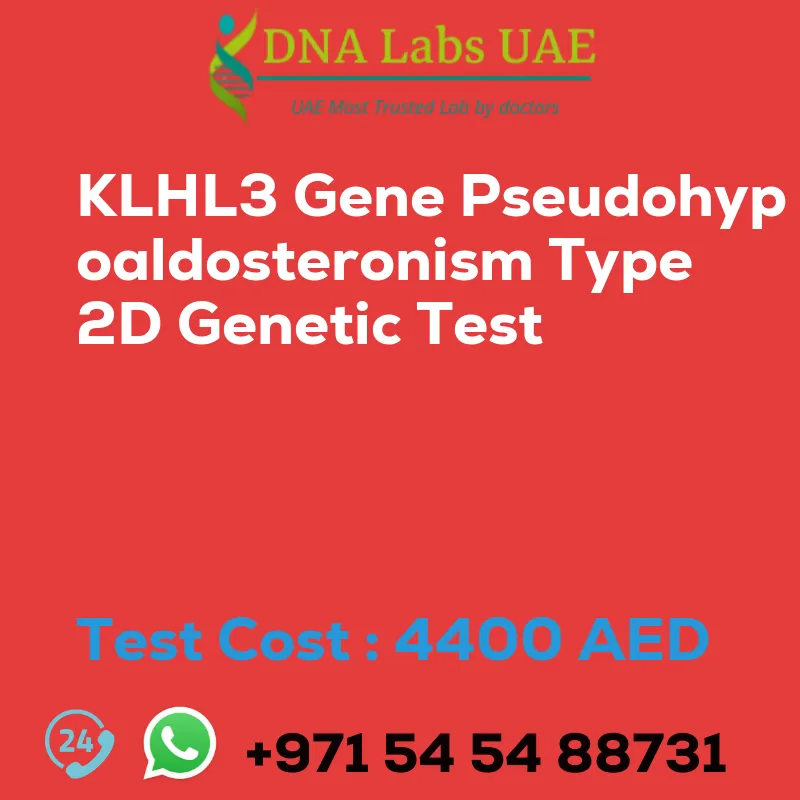KLHL3 Gene Pseudohypoaldosteronism type 2D Genetic Test
At DNA Labs UAE, we offer the KLHL3 Gene Pseudohypoaldosteronism type 2D Genetic Test at a cost of AED 4400.0. This test is used to identify mutations or variations in the KLHL3 gene that may be responsible for causing PHA2D.
Components
- Price: 4400.0 AED
- Sample Condition: Blood or Extracted DNA or One drop Blood on FTA Card
- Report Delivery: 3 to 4 Weeks
- Method: NGS Technology
- Test type: Vascular Diseases
- Doctor: General Physician
- Test Department: Genetics
Pre Test Information
Before undergoing the KLHL3 Gene Pseudohypoaldosteronism type 2D NGS Genetic DNA Test, it is important to provide the clinical history of the patient. Additionally, a genetic counseling session will be conducted to draw a pedigree chart of family members affected by the KLHL3 Gene Pseudohypoaldosteronism type 2D NGS Genetic DNA Test gene KLHL3.
Test Details
The KLHL3 gene is associated with a rare genetic disorder called pseudohypoaldosteronism type 2D (PHA2D). This condition affects the kidneys’ ability to regulate salt and water balance in the body. Common symptoms include high blood pressure, low potassium levels, and metabolic acidosis, which typically appear in infancy or early childhood.
NGS (Next-Generation Sequencing) technology is used for this genetic test. It allows for the rapid and efficient sequencing of large amounts of DNA. In the context of genetic testing, NGS can analyze multiple genes simultaneously, including the KLHL3 gene, to identify any mutations or variations that may be present.
The KLHL3 gene NGS genetic test involves obtaining a sample of the patient’s DNA, usually through a blood sample or cheek swab. The DNA is then sequenced using NGS technology to analyze the entire coding region of the KLHL3 gene. Any mutations or variations in the gene can be identified and analyzed to determine if they are responsible for the development of PHA2D.
Genetic testing for PHA2D can help confirm a diagnosis, guide treatment decisions, and provide information about the inheritance pattern of the condition. It can also be useful for family members who may be at risk of inheriting the gene mutation. It’s important to note that genetic testing should be done under the guidance of a healthcare professional or genetic counselor who can provide appropriate counseling and support.
| Test Name | KLHL3 Gene Pseudohypoaldosteronism type 2D Genetic Test |
|---|---|
| Components | |
| Price | 4400.0 AED |
| Sample Condition | Blood or Extracted DNA or One drop Blood on FTA Card |
| Report Delivery | 3 to 4 Weeks |
| Method | NGS Technology |
| Test type | Vascular Diseases |
| Doctor | General Physician |
| Test Department: | Genetics |
| Pre Test Information | Clinical History of Patient who is going for KLHL3 Gene Pseudohypoaldosteronism type 2D NGS Genetic DNA Test. A Genetic Counselling session to draw a pedigree chart of family members affected with KLHL3 Gene Pseudohypoaldosteronism type 2D NGS Genetic DNA Test gene KLHL3 |
| Test Details |
The KLHL3 gene is associated with a condition called pseudohypoaldosteronism type 2D (PHA2D). This genetic test is used to identify mutations or variations in the KLHL3 gene that may be responsible for causing PHA2D. Pseudohypoaldosteronism type 2D is a rare genetic disorder that affects the kidneys’ ability to regulate salt and water balance in the body. It is characterized by high blood pressure, low potassium levels, and metabolic acidosis. Symptoms typically appear in infancy or early childhood. NGS (Next-Generation Sequencing) is a high-throughput sequencing technology that allows for the rapid and efficient sequencing of large amounts of DNA. In the context of genetic testing, NGS can be used to analyze multiple genes simultaneously, including the KLHL3 gene, to identify any mutations or variations that may be present. The KLHL3 gene NGS genetic test involves obtaining a sample of the patient’s DNA, usually through a blood sample or cheek swab. The DNA is then sequenced using NGS technology to analyze the entire coding region of the KLHL3 gene. Any mutations or variations in the gene can be identified and analyzed to determine if they are responsible for the development of PHA2D. Genetic testing for PHA2D can help confirm a diagnosis, guide treatment decisions, and provide information about the inheritance pattern of the condition. It can also be useful for family members who may be at risk of inheriting the gene mutation. It’s important to note that genetic testing should be done under the guidance of a healthcare professional or genetic counselor who can provide appropriate counseling and support. |








